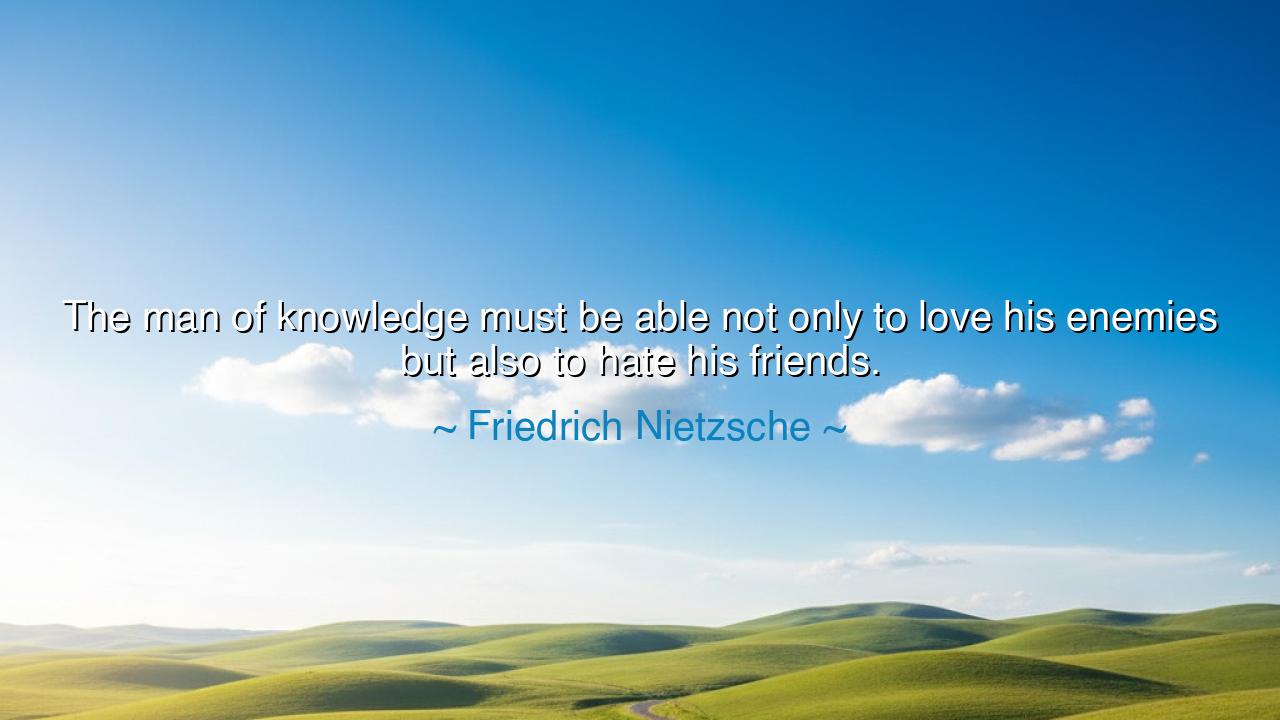
The man of knowledge must be able not only to love his enemies
The man of knowledge must be able not only to love his enemies but also to hate his friends.






“The man of knowledge must be able not only to love his enemies but also to hate his friends.” – Friedrich Nietzsche
There are few thinkers whose words strike the human heart with such paradoxical fire as those of Friedrich Nietzsche. In this bold declaration, Nietzsche invites us into the labyrinth of the man of knowledge, the seeker of truth who walks alone between light and shadow. To love one’s enemies—this, the world may understand as the path of mercy and moral greatness. But to hate one’s friends—that is a mystery, a teaching that pierces through comfort into the realm of higher wisdom. Nietzsche, the philosopher of courage and transformation, tells us that true understanding demands a heart strong enough to see beyond loyalty, and a mind free enough to question even those closest to it.
To love one’s enemies means to rise above bitterness—to see one’s opponents not as villains, but as mirrors reflecting our weaknesses and our strength. The man of knowledge sees in his enemies not destruction, but instruction. They challenge him, sharpen him, force him to grow. Love, in this sense, is not affection—it is recognition. It is the noble act of acknowledging the necessity of opposition in one’s becoming. Yet, to hate one’s friends is something deeper still. It is the capacity to detach from blind loyalty, to see that even friendship can bind, deceive, and corrupt when it demands conformity. The true seeker must sometimes turn against the comfortable circle that protects ignorance and silences truth.
The origin of this thought lies in Nietzsche’s lifelong rebellion against complacency and moral stagnation. He saw society as a web of half-truths, where even friends—those who mean well—often seek to keep one another from transcending mediocrity. To “hate one’s friends” does not mean to despise them, but to have the courage to defy them when they hinder one’s higher calling. Nietzsche himself knew this pain. He broke away from his closest friend and mentor, Richard Wagner, whose music once inspired him but whose nationalism and sentimentality came to disgust him. It was not hatred born of malice, but of moral necessity—a fierce act of spiritual honesty. In rejecting the comfortable bond, Nietzsche preserved his integrity, though it left him utterly alone.
There is a lesson in this that echoes through time. Consider Socrates, the ancient philosopher who, surrounded by admirers, refused to speak what pleased them. His love for truth was so fierce that he accepted death rather than betray it. Many who called him friend urged him to flee Athens, to preserve his life. Yet he refused, choosing instead to remain faithful to his principles. In that moment, he “hated his friends”—that is, he chose truth over comfort, duty over sentiment. Such is the mark of the man of knowledge: he serves truth even when it costs him companionship, reputation, and peace.
To love enemies and to hate friends are, in truth, two sides of the same coin: the mastery of attachment. Both demand a soul that stands sovereign over emotion, unruled by fear or flattery. The wise man knows that his enemies can teach him courage, and his friends can lull him into complacency. He does not reject friendship, but he refuses to let affection blind his judgment. He walks with love in one hand and fire in the other—able to embrace, and when necessary, to burn away. This is not cruelty, but clarity; not arrogance, but integrity.
How many have fallen because they feared to disappoint their allies? How many truths have been buried under the weight of friendship? The world is full of men who dare to speak against their foes but tremble to question their companions. The man of knowledge, Nietzsche tells us, must transcend this weakness. His allegiance is not to men, but to truth itself. He must be willing to stand apart, even from those he loves, when the path of wisdom demands it.
And so, the lesson for all who walk the road of learning is this: guard your soul from both hatred and comfort. Love your enemies, for they reveal your strength. Hate your friends, when they ask you to betray your higher purpose. Seek not the approval of the many, but the peace that comes from inner truth. Let your heart be vast enough to love all, and your mind sharp enough to resist all that would enslave it. For the man of knowledge stands alone in the storm, not because he despises others, but because he loves truth above all else—and in that sacred solitude, he becomes free.






AAdministratorAdministrator
Welcome, honored guests. Please leave a comment, we will respond soon